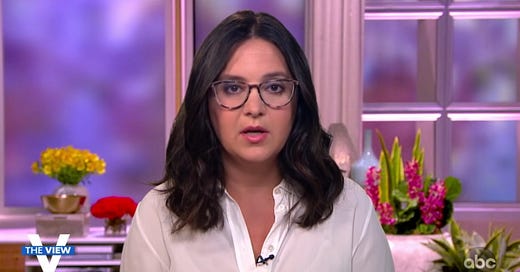I try not to get too bogged down in the cancel culture discourse because it is so often stupid, but I couldn't help myself after reading the latest dispatch from Bari Weiss. It begins this way:
The dissidents use pseudonyms and turn off their videos when they meet for clandestine Zoom calls. They are usually coordinating soccer practices and carpools, but now they come together to strategize. They say that they could face profound repercussions if anyone knew they were talking.
But the situation of late has become too egregious for emails or complaining on conference calls. So one recent weekend, on a leafy street in West Los Angeles, they gathered in person and invited me to join.
Oooh, the "dissidents"! What cloak-and-dagger stuff is this?
In a backyard behind a four-bedroom home, ten people sat in a circle of plastic Adirondack chairs, eating bags of Skinny Pop. These are the rebels: well-off Los Angeles parents who send their children to Harvard-Westlake, the most prestigious private school in the city.
Oh, uh, OK. The article is a typical entry in the Weiss canon—tales of very rich high school students rendered helpless against the tide of woke studies, of great literature tossed on the scrap-heap by rampaging race theorists, that sort of thing. It is long on feverish hearsay—“There are definitively rumors that the school has like, say, three picks for Duke and that if you stand up against this your kid will get blackballed,” one person tells Weiss—and somewhat shorter on straightforward examples. As is Weiss' wont, it elides or overlooks what could actually be serious problems that the people she maligns are trying to solve (read this thread for a very different view of the Harvard-Westlake community). And, like so much of Weiss' work, it is couched in the most lurid kind of tone, as though she is trying to conjure up a Cold War spy thriller out of the passingly interesting story of some wealthy people who are dealing with changing cultural mores.
Weiss is kind of addicted to this tic. She is, after all, the person who wrote these lines (emphasis hers):
Almost no one who calls me is willing to go public. And I understand why. To go public with what’s happening is to risk their jobs and their reputations.
But the hour is very late. It calls for courage. And courage has come in the form of a woman named Jodi Shaw.
"The hour is very late" is the kind of thing that you expect to see in a movie about Winston Churchill gazing up as the Blitz rains down on London, not connected to what Weiss is actually discussing, which is a white woman who was not allowed to do a rap presentation about the library at Smith College. The woman is clearly mad, but is this a "fascism descends on the land" situation? Hmm, perhaps not.
I am not the only one who has noticed this tendency of Bari Weiss'.
https://twitter.com/graceelavery/status/1369670524511600640
I am not saying that there are never any issues at stake in the stories Weiss and her ilk surface. This is a tumultuous time we are living through, and people make mistakes—though, as has been endlessly pointed out, Weiss and co. never seem to get quite as agitated when the First Amendment rights under threat concern the right to advocate for, say, Palestine. But I will just gently suggest that, if you have to constantly pump your writing up to the point where stories about the feuds of American elites are framed like an airport novel about escaping the gulag, you might be giving away the game a bit. If Weiss had the goods, she wouldn't need to sell us so much on their value.





